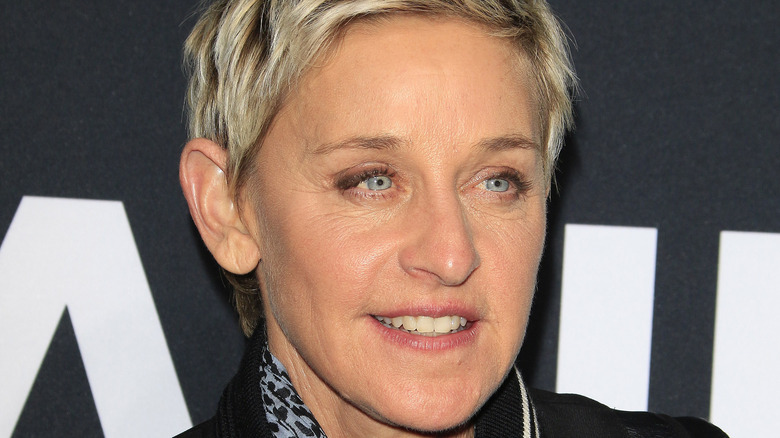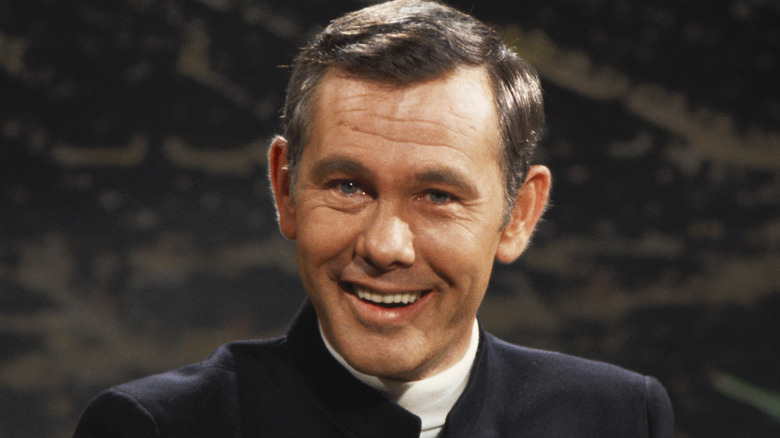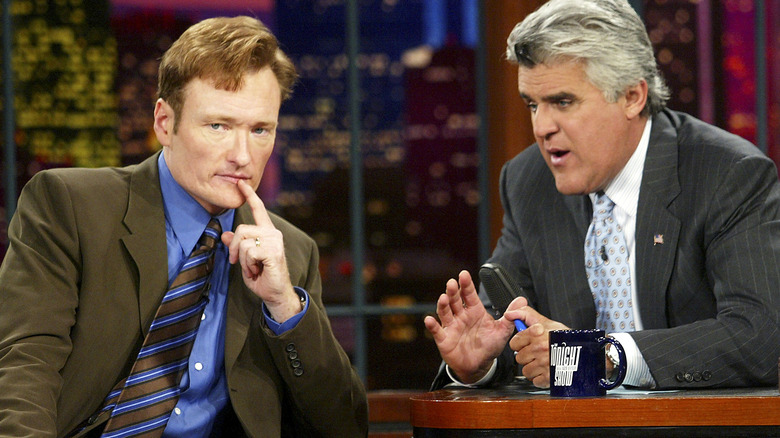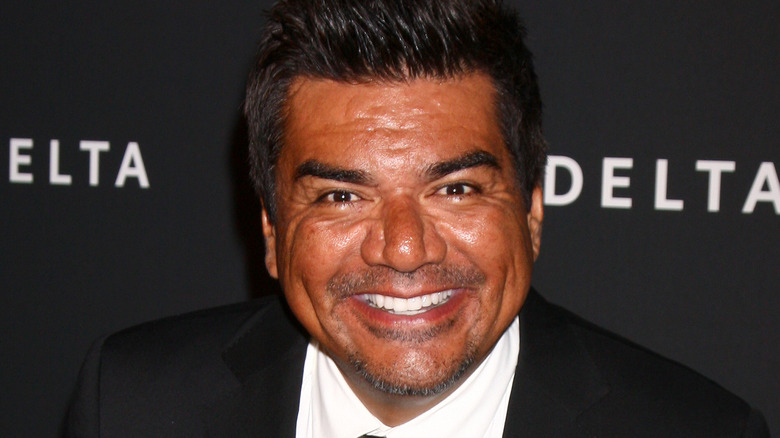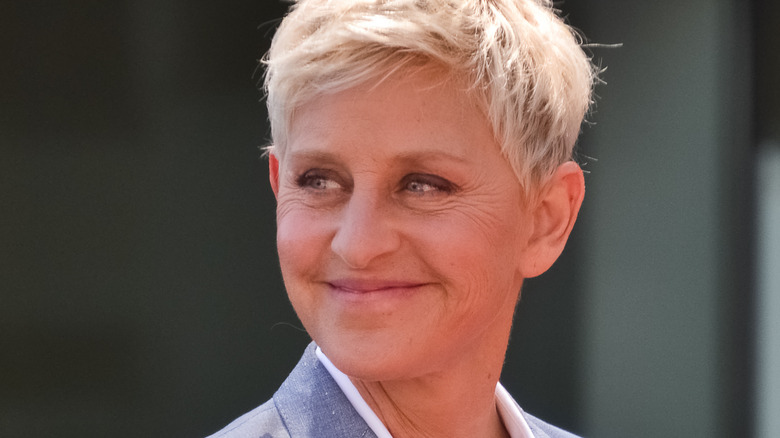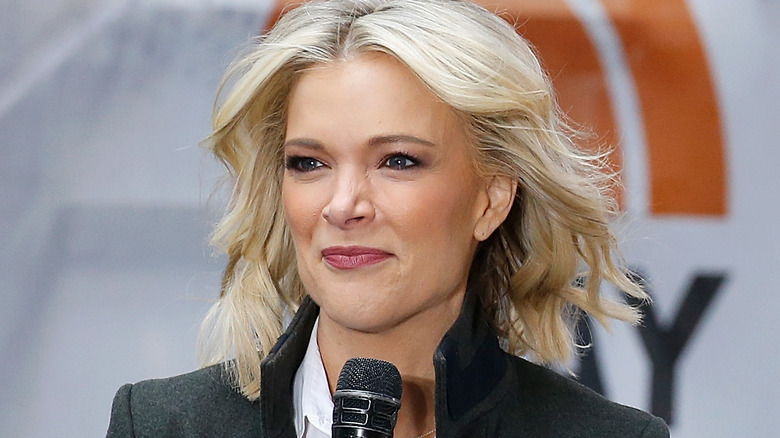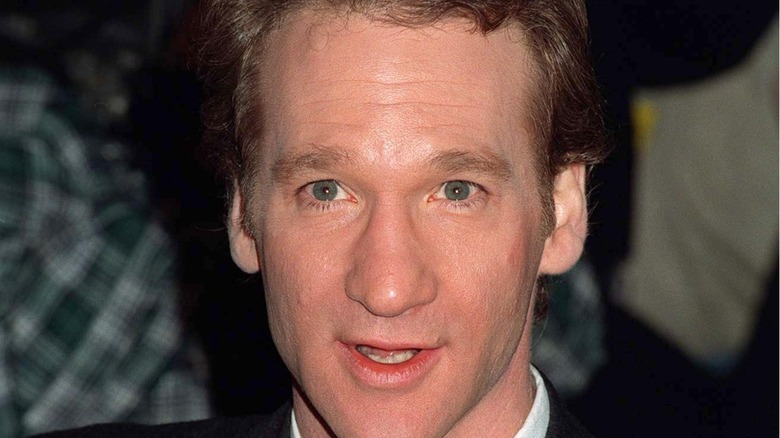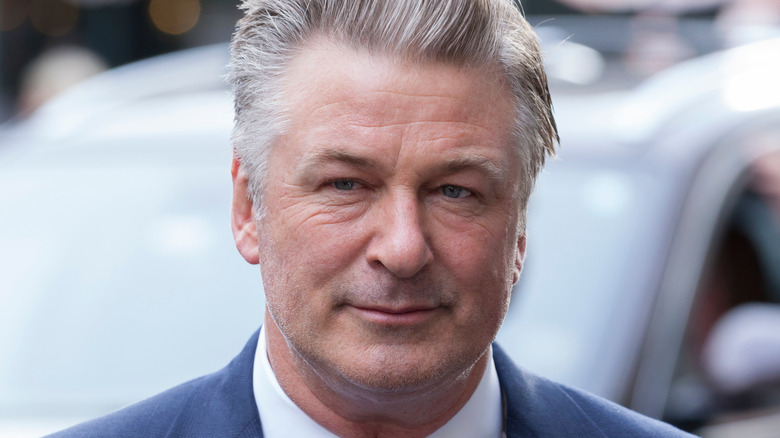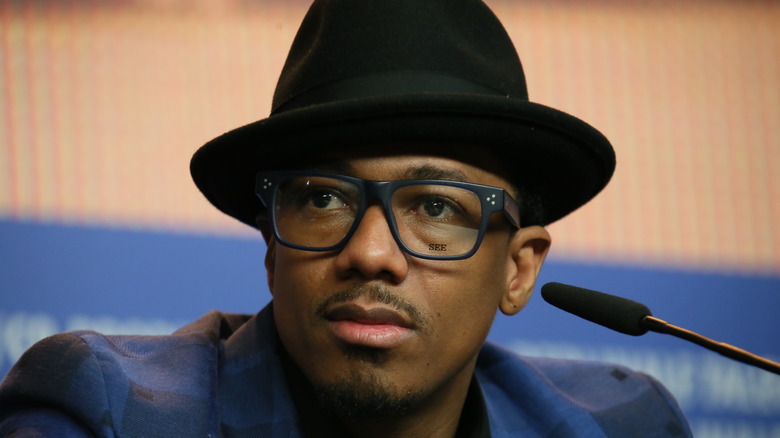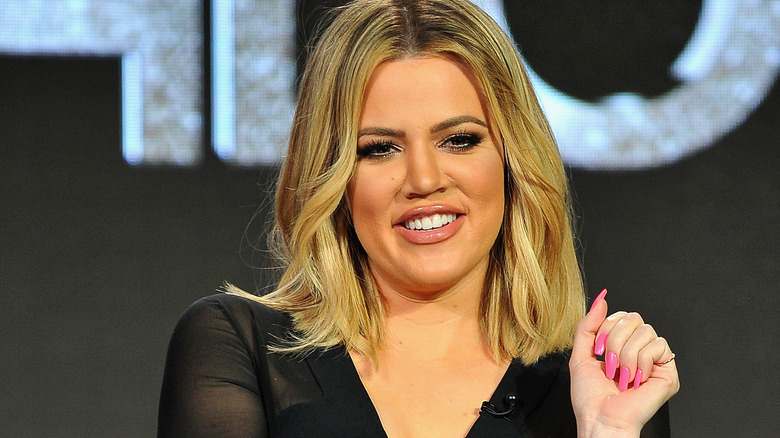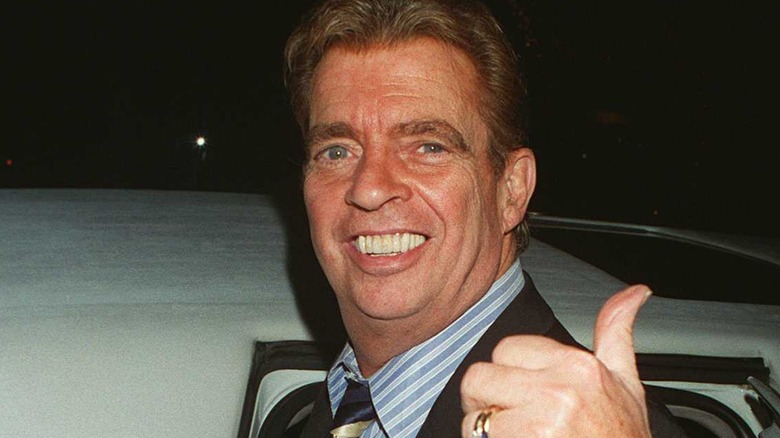Talk Shows That Ended In Controversy
Talk shows have been a part of television since the medium took off and have endured for decades — for good reason, too. The talk show is in many ways television exemplified — a host's chat with one or more guests is an intimate affair, beamed right into viewers' living rooms, but it can also feel inviting, like a big show or a party. Further cementing the talk show as a TV staple: They're relatively cheap and easy to produce, as they consist mainly of, well, people talking, but with the occasional musical performance, comedy sketch, or fun bit thrown in for good measure.
At any rate, talk shows are supposed to be, and usually are, a laid-back affair, a way for viewers to comfortably start their day, pleasantly kill some time in the afternoon, or wind down in an entertaining fashion around midnight. The content of talk shows, be they morning talk shows, daytime talk shows, or late-night talk shows, is chill, but their ejection from the television landscape can be anything but. Here are some otherwise amiable shows that went down in flames, their cancellation the result of backstage or on-the-air drama, scandal, and controversy.
The end of The Tonight Show Starring Johnny Carson was a scandalous affair
As the host of NBC's "The Tonight Show" for three decades, the funny and charming Johnny Carson usually destroyed whatever competition came his way, from Alan Thicke's "Thicke of the Night" to David Brenner's "Nightlife." By the early '90s, Carson's program was showing its age, and competitors like "The Arsenio Hall Show" drew hipper guests and younger audiences. NBC had quietly been considering a transition since the mid-1980s. After regular "Tonight Show" substitute host Joan Rivers (who filled in for Carson on his many vacation days) jumped to Fox for the short-lived "The Late Show," Jay Leno became the new permanent guest host, putting him in prime position to succeed Carson, if and when he retired.
By February 1991, with Carson making no public comments about retirement, Leno's manager Helen Kushnick got the ball rolling. According to The New York Times, she had a colleague plant a story in the New York Post, alleging that NBC was "Looking to Dump Carson for Jay Leno." Carson took the hostile hint, and at an NBC affiliates meeting in May 1991, he announced that he'd leave "The Tonight Show" in one year's time (via South Florida Sun-Sentinel). After toying with the idea of offering the show to "Late Night" host David Letterman, NBC gave "The Tonight Show" to Leno, and Letterman fled to CBS.
NBC got rid of Conan O'Brien's Tonight Show to reinstall Jay Leno
In 2004, Jay Leno signed a $100 million, five-year extension with NBC, per Entertainment Weekly. Later that year, according to Variety, Fox offered NBC's "Late Night" host Conan O'Brien a show in an earlier time slot. That prompted NBC to re-sign O'Brien, promising him "The Tonight Show" — in 2009, when Leno's contract expired, according to The New York Times. But when the time came, Leno wasn't ready to leave. NBC was so worried that he'd move to another network (per The New York Times) that it kept him around. A few months after "The Tonight Show with Conan O'Brien" debuted in 2009, NBC's fall 2009 schedule included "The Jay Leno Show," essentially "The Tonight Show" but airing in primetime, five nights a week.
It was a critical and ratings flop, yet rather than cancel "The Jay Leno Show," according to Entertainment Weekly, NBC proposed moving the unpopular talk show to 11:35 p.m., pushing "The Tonight Show with Conan O'Brien" to past midnight. O'Brien refused. "Delaying 'The Tonight Show' into the next day to accommodate another comedy program will seriously damage what I consider to be the greatest franchise in the history of broadcasting," he said in a statement (via HuffPost). In January 2010, O'Brien stepped aside, with NBC paying him (and his staff) $40 million to walk away (per The Wall Street Journal). His successor at "The Tonight Show": Jay Leno.
George Lopez thinks race was a factor in the end of Lopez Tonight
One of the reasons Conan O'Brien gave for leaving NBC is that he didn't want to push "The Tonight Show" until after midnight, which would also bump "Late Night" further into the night. When he resurfaced in November 2010 with "Conan" on TBS, that cable network had to move its pre-existing talker, "Lopez Tonight," hosted by stand-up comedian George Lopez, to a later time slot, according to The Hollywood Reporter. Around the time of the switch, Lopez said on his show (via Deadline) that he was "completely 100 percent on board with this move." But in August 2011, TBS cut "Lopez Tonight" from the lineup, which according to Variety, followed a 40 percent ratings drop.
Two years later, Lopez discussed the matter on "HuffPost Live," revealing that O'Brien had reached out and offered an empathetic ear should Lopez "ever need anybody to vent to" about late-night politics. "'You got a paycheck for $40 million, how am I gonna vent to you?'" Lopez quipped. "We didn't get the same respect that NBC gave him, and he b****ed for two years. I took my hit like a man, and I went away." Lopez, a man of Latino heritage, also thinks the racial makeup of his audience played a factor in the cancellation of "Lopez Tonight." "I don't think TBS wanted that show. I don't think they wanted that demographic."
Ellen DeGeneres canceled herself
In May 2019, according to Deadline, Ellen DeGeneres signed an extension to keep "The Ellen DeGeneres Show" on television until 2022. That renewal was a no-brainer — at the time, the aggressively positive "Ellen" was in the midst of an eight-year run as the top-rated daytime talk show and the recipient of more than 60 Emmy Awards since its debut in 2003. Two years later, the comedian told The Hollywood Reporter that she intended to close down the show in 2022. "When you're a creative person, you constantly need to be challenged — and as great as this show is, and as fun as it is, it's just not a challenge anymore."
However, the demise of "The Ellen DeGeneres Show" wasn't exactly a shocking surprise. In 2018, DeGeneres told The New York Times that her wife, actor Portia de Rossi, wanted her to scale back on her professional commitments. The end of the show also came amidst major behind-the-scenes problems. According to Entertainment Weekly, comedian Kevin T. Porter started a Twitter thread asking for "the most insane stories you've heard about Ellen being mean." The so-called "Queen of Nice" reportedly wasn't always as kind as viewers thought — former colleagues told tales about how they'd been asked not to make eye contact with DeGeneres, or how they'd not been told how the show would proceed during COVID-19 protocols. Staffers told stories about a "toxic" workplace characterized by threats, harassment, intimidation, and wrongful termination.
Megyn Kelly Today ended after its host didn't think blackface was a big deal
After reporting on politics on Fox News for 12 years, Megyn Kelly was interested in a more lighthearted gig, according to CNN. In 2017, NBC set her up with "Megyn Kelly Today," a talk show that ran in the primo 9 a.m. time slot. From the beginning, Kelly generated controversy. In the first episode, Kelly asked Russell Turner, a gay man and attorney, in front of the "Will and Grace" cast, if it was "true that you became a lawyer — and you became gay — because of Will?" Days later, per Entertainment Weekly, Kelly tried to get guest Jane Fonda to admit to having had cosmetic surgery.
But it's Kelly's comments in October 2018 that would lead to her show's demise."There are strict rules on what you may and may not wear issued by someone who thinks they're the boss of you," she said in an introduction to a segment on culturally problematic Halloween costumes in which she expressed regret that blackface was no longer acceptable. "You do get in trouble if you are a white person who puts on blackface on Halloween," Kelly said. "Back when I was a kid that was okay, as long as you were dressing up as, like, a character." Kelly apologized, but two days later NBC canceled "Megyn Kelly Today."
Politically Incorrect lived up to its name
Four years into its run on Comedy Central, ABC imported Bill Maher's "Politically Incorrect" to its late-night lineup. Each night Maher invited on four new guests — celebrities, writers, politicians, wonks — who would engage in sometimes heated debate about political and social issues. Things could get sticky and complicated, as they did on the September 17, 2001, episode. Less than a week after the events of 9/11, Maher and guest Dinesh D'Souza discussed a remark by President George W. Bush that the terrorists who had hijacked and crashed planes were "cowards," according to The New York Times. D'Souza begged to differ, noting that the terrorists "slammed themselves into pieces of concrete," and called them "warriors." Maher agreed, labeling the American government as the ones who were the "the cowards, lobbing cruise missiles from 2,000 miles away," and that "staying in the airplane when it hits the building" was "not cowardly."
The backlash arrived in the form of many ABC affiliates refusing to air "Politically Incorrect" anymore. Maher released a statement apologizing for and clarifying his remarks, stating that he had not intended to verbally attack the U.S. military. But the damage was done. Over the next few months, ratings dropped, major companies refused to advertise on the show any longer, and ABC canceled "Politically Incorrect" in May 2002.
Alec Baldwin's MSNBC show was canceled after he yelled epithets at a photographer
In fall 2013, shortly after concluding a seven-year run on "30 Rock," where he transitioned from A-list movie star into a multi-Emmy-winning comic actor, Alec Baldwin took on another career shift and signed on to host "Up Late" on Friday nights for the cable news channel MSNBC, which network president Phil Griffin told The Hollywood Reporter was its first "pure interview show." Despite the celebrity power of Baldwin and the pull of his movie star guests, "Up Late" didn't get the rating charts on fire, averaging under a million viewers at launch, and quickly falling to a regular tally of about 395,000.
"Up Late" lasted just four episodes, but poor numbers aren't entirely to blame. In November 2013, according to Page Six, a New York Post photographer tried to take Baldwin's picture while he was on the streets of Manhattan. He wasn't happy about it and screamed two anti-LGBT slurs at the individual. After public criticism, NBC Universal suspended Baldwin and "Up Late" for two weeks. Then the suspension became permanent when the company just went ahead and pulled the plug on the whole thing.
Nick Cannon's anti-Semitic remarks got his talk show pushed back
Nick Cannon made himself into one of the most prolific people in entertainment. A stand-up comedian and star of movies like "Drumline" and "Love Don't Cost a Thing," he created and hosted the MTV improv comedy show "Wild 'n Out," hosts Fox's "The Masked Singer," and produced a podcast called "Cannon's Class." In 2019, Entertainment Weekly reported that TV producer Lionsgate was developing a daytime talk show for Cannon. "I've always dreamed of a platform where I can speak to America and discuss pop culture, as well as the topics on everyone's minds," Cannon said in a statement. But then Cannon went on "Cannon's Class" in June 2020 and discussed a topic on his mind.
His guest: Professor Griff of Public Enemy, who left the rap collective in 1989 after making defamatory statements about Jewish people in The Washington Post, according to Vulture. The conversation on the podcast veered into that territory, with Cannon citing his belief in an idea which many have called an anti-Semitic conspiracy theory that 13 Jewish families "control everything." Nick Cannon apologized on Twitter to his "Jewish sisters and brothers," and MTV ended its relationship with the entertainer. Lionsgate, per The Hollywood Reporter, preemptively and temporarily canceled its planned Cannon talk show. Already set to air in 90 percent of the country, the producer opted to wait to debut it until late in 2021.
Production problems drowned Kocktails with Khloe
Having already helped her family conquer reality television with light, frothy, soapy, and aspirational shows like "Keeping Up with the Kardashians," "Kourtney & Khloe Take the Hamptons," and "Khloe & Lamar," Khloe Kardashian explored a new and novel TV format in 2016 with the launch of "Kocktails with Khloe" on the FYI Network. The show, which replicated the energy of a casual happy hour or dinner party (but with celebrity guests) was a smash for the relatively little-known channel — the premiere episode in January 2016 was the most-watched debut in FYI history, according to Entertainment Weekly.
And yet, FYI canceled "Kocktails with Khloe" in April 2016 after just 14 episodes, negating an order for an additional 15 installments. According to Page Six, the show was more trouble than it was worth for producers and executives. "It was chaos," a source familiar with the production of the show said. "Nobody agreed with anybody else about what it should be or what direction it should be going." A lot of that tension and turmoil may have come from Kardashian herself. "Khloe's used to being on a smash-hit show and being able to call the shots," another insider said. "But it's not like that on a small show ... everyone had enough."
Was this incident on The Morton Downey Jr. Show a hoax?
Morton Downey Jr. brought his abrasive and combative "The Morton Downey Jr. Show" from New York to national syndication in the late '80s. Downey actively antagonized his guests, blowing smoke from the cigarettes he chain-smoked during tapings in their faces and calling them "scumbuckets" or "pablum pukers," per New Haven Register. Downey's loyal fans and audience members, who proudly called themselves "Loudmouths," were invited to question and berate guests from podiums, and the proceedings could and did descend into fisticuffs.
Despite (or because of) its controversial and divisive nature, "The Morton Downey Jr." pulled in large audiences for two seasons. In April 1989, according to The Washington Post, Downey reported having received some of the hostility his show put out into the world when he claimed to have suffered an attack by a group of Neo-Nazi men in a bathroom at San Francisco International Airport. Per SFGate, Downey showed off the results of the assault on TV, such as a missing chunk of hair and the swastika drawn on his face. Airport police, however, could find no evidence of or witnesses to the attack, also noting that the swastika on Downey's face on TV did not match the "markings our officers saw on his face when they investigated the incident." Further, the ones Downey showed off were seemingly drawn backward, as if done in a mirror.
In light of what was likely a hoax, producers canceled "The Morton Downey Jr. Show" in July 1989.

